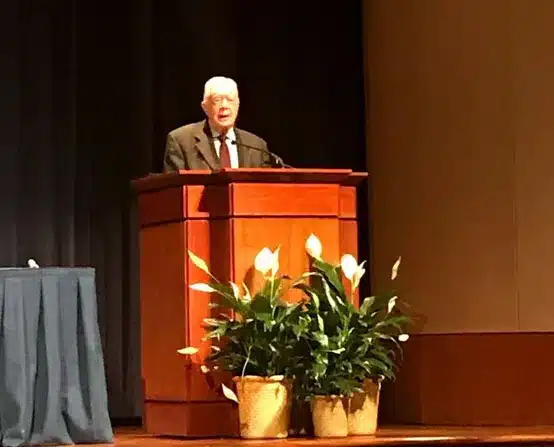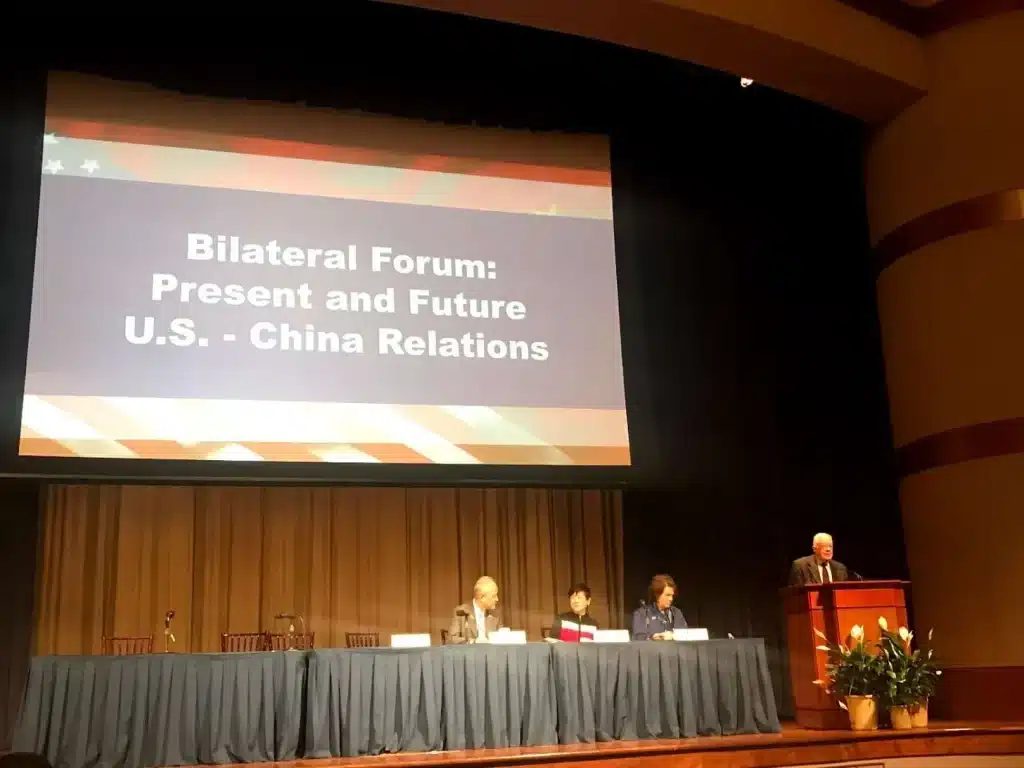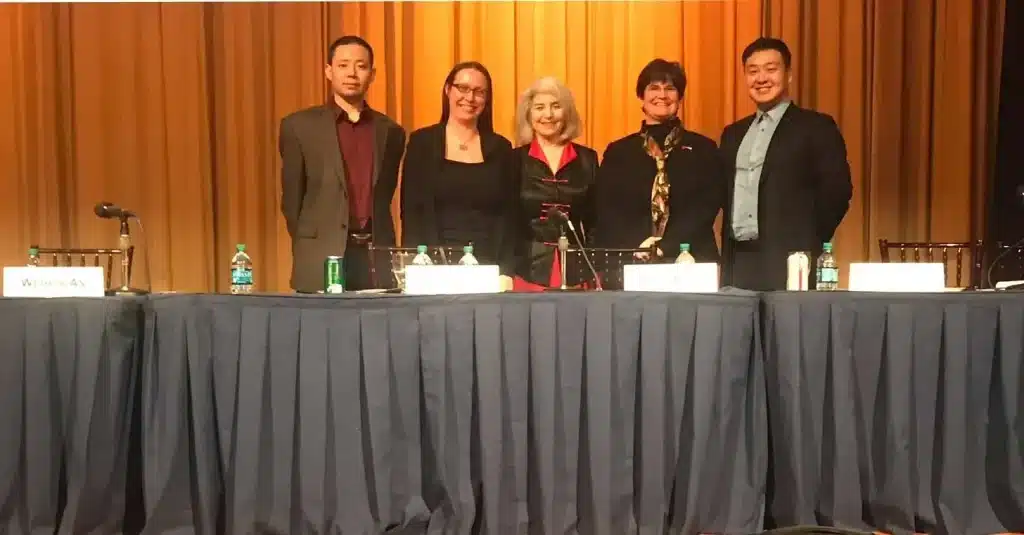Carter Presidential Center, Atlanta, GA, credit Wang Peng
On December 29, 2024, I was deeply saddened to learn of the passing of former U.S. President Jimmy Carter at the age of 100. As one of the most distinguished diplomats in U.S. history, Carter’s death marks the loss of a figure who embodied wisdom, integrity, and a commitment to global peace. It also provides an opportunity to reflect on his monumental contributions to Sino-American relations. I was fortunate to meet President Carter five years ago in January 2019, when I was invited as a young scholar by the Carter Center, one of the most renowned think tanks in the United States, to visit Atlanta. At that time, I had the honor of meeting this elder statesman who had played a pivotal role in the history of U.S.-China relations.

That day remains vivid in my memory. At the time, Carter was in excellent health. During a 15-minute speech, he spoke with clarity and energy, and without needing any assistance, ascended and descended the stage with ease. However, time has passed, and now, the world bids farewell to this man of great wisdom. He survived the pandemic and passed away at a moment when Sino-American relations seemed poised to enter a challenging new phase. If this departure is indeed by divine will, it reflects the mercy shown to this kind-hearted man. If it was his own decision, it would be yet another testament to Carter’s profound wisdom and political insight.
When reflecting on his presidency, Carter often stated that “normalizing relations with China might be the greatest contribution to world peace and mutual understanding” he had made during his time in office. With this in mind, it is essential to explore the lasting impact of Carter’s role in Sino-American relations and analyze the future trajectory of this crucial bilateral relationship, especially in the current climate of rising tensions.

Carter’s Contributions to US-China Relations
Jimmy Carter’s presidency marked a transformative period for Sino-American relations. On January 1, 1979, Carter officially announced the normalization of diplomatic relations between the United States and the People’s Republic of China. This historic event laid the foundation for the flourishing of Sino-American ties and reshaped global geopolitics.
One of Carter’s most significant contributions was his commitment to opening a new chapter in Sino-American relations. In the context of the Cold War, U.S.-China relations were strained and complicated. The decision to normalize relations was not just a diplomatic gesture; it was a courageous and visionary step that reflected Carter’s belief in the importance of engaging with China as a rising global power. His administration’s efforts to build this bridge were instrumental in breaking down the ideological and strategic barriers that had defined U.S.-China interactions for decades.
In particular, Carter’s decision to recognize the People’s Republic of China as the sole legitimate government of China—thus severing formal ties with the Republic of China (Taiwan)—was a landmark move. This shift in U.S. policy was crucial not only in terms of international diplomacy but also for the domestic politics of both the U.S. and China. It paved the way for economic cooperation and cultural exchanges that continue to this day.
Furthermore, Carter’s role in the establishment of the “One China” policy, which remains the cornerstone of Sino-American relations, cannot be overstated. His decision to pursue this policy, despite significant opposition, demonstrated his far-reaching understanding of the geopolitical realities of the time. By doing so, Carter ensured that the U.S. and China could cooperate on shared global challenges, even as the two nations continued to diverge in other areas.
The Current State of US-China Relations
As we reflect on Carter’s legacy, it is impossible to ignore the current state of Sino-American relations. Today, Sino-American ties are marked by a complex mix of cooperation, competition, and confrontation. On the one hand, the two countries maintain robust economic exchanges and collaborate on issues such as climate change, public health, and global security. On the other hand, growing tensions in areas such as trade, technology, and military competition have led to a deteriorating relationship.
In recent years, the U.S.-China relationship has become increasingly strained due to a number of factors. The ongoing trade war, the technological rivalry between U.S. and Chinese companies, and military concerns in the South China Sea and Taiwan Strait have all contributed to an atmosphere of mistrust. The rise of China as a global economic and technological power has also led to concerns within the U.S. about China’s increasing influence on the world stage.
At the same time, both countries are interdependent in ways that cannot be ignored. The economic ties between China and the U.S. are vital not only to their own prosperity but also to global stability. Moreover, as global challenges such as climate change, pandemics, and nuclear proliferation continue to require multilateral solutions, the need for constructive dialogue between the two nations remains as pressing as ever.
The Path Forward: Rebuilding Trust and Cooperation
Looking to the future, it is crucial that both the U.S. and China find ways to rebuild trust and cooperation. As we enter the new era of Sino-American relations, it is clear that the relationship will be characterized by both competition and collaboration. The question is not whether the two countries will compete—they undoubtedly will—but how they will manage that competition in a way that does not lead to open conflict.
To ensure a positive future for Sino-American relations, both sides must focus on several key areas. First, there needs to be a renewed commitment to dialogue and diplomacy. The channels of communication between the two countries must remain open to prevent misunderstandings and manage conflicts before they escalate. Second, both countries should seek to find common ground on global challenges. Issues such as climate change, public health, and nuclear nonproliferation present opportunities for cooperation that can benefit both nations and the world as a whole.
Moreover, economic and trade relations should be recalibrated to reflect the evolving global economy. While competition in technology and trade is inevitable, it is essential that both nations avoid the pitfalls of economic decoupling. A mutually beneficial trade relationship that respects both countries’ interests will be vital for global economic stability.
Finally, both the U.S. and China should seek to build mutual respect and understanding. As Carter once said, one of the greatest contributions to world peace is fostering mutual understanding. In an era marked by rising nationalism and geopolitical tensions, this message remains as relevant as ever.
In remembering President Carter, we honor not only his legacy as a statesman but also the transformative role he played in shaping Sino-American relations. His efforts to normalize diplomatic ties between the U.S. and China created a foundation upon which both countries have built a complex and multifaceted relationship. As we face the challenges of today and tomorrow, it is essential to remember the vision and wisdom Carter brought to the world stage. By renewing the spirit of cooperation, trust, and dialogue that he championed, we can navigate the future of Sino-American relations and work together to build a more peaceful and prosperous world for all.


